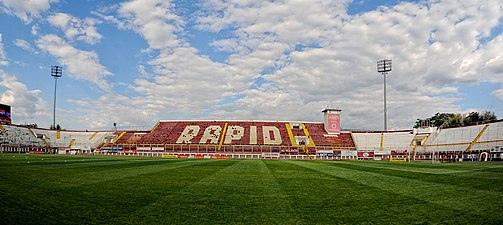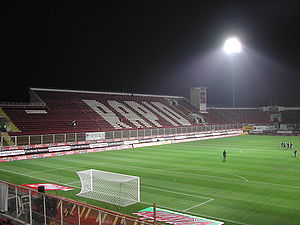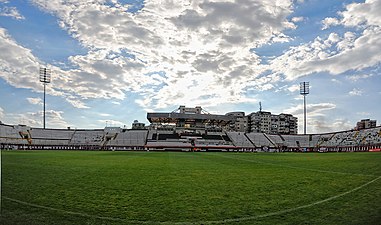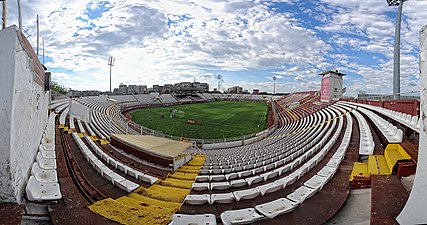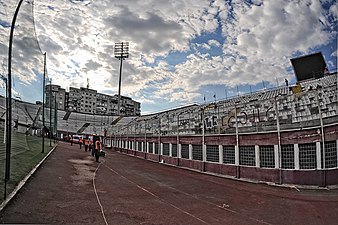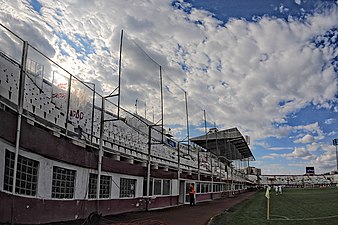Stadionul Giulești-Valentin Stănescu (1939): Difference between revisions
| Line 77: | Line 77: | ||
{{DEFAULTSORT:Giulesti-Valentin Stanescu, Stadionul}} |
{{DEFAULTSORT:Giulesti-Valentin Stanescu, Stadionul}} |
||
[[Category:FC Rapid București]] |
[[Category:FC Rapid București]] |
||
[[Category:Football venues in Romania]] |
[[Category:Football venues in Romania]] |
||
[[Category:Buildings and structures in Bucharest]] |
|||
[[Category:Sports venues in Bucharest]] |
|||
[[Category:Defunct football venues in Romania]] |
[[Category:Defunct football venues in Romania]] |
||
[[Category:Sports venues completed in 1939]] |
[[Category:Sports venues completed in 1939]] |
||
Revision as of 12:32, 4 October 2019
 | |
 | |
| Former names | Stadionul Giulești |
|---|---|
| Address | Calea Giulești, nr. 18 |
| Location | Bucharest, Romania |
| Coordinates | 44°27′21.3″N 26°3′24.6″E / 44.455917°N 26.056833°E |
| Owner | Ministry of Transport |
| Capacity | 11,704 seated (restricted from 19,100) |
| Field size | 102 x 68m |
| Surface | Grass |
| Construction | |
| Opened | 10 June 1939 |
| Renovated | 2003 |
| Expanded | 1996 |
| Closed | 24 November 2018 |
| Demolished | 10 January 2019 - 7 May 2019 |
| Tenants | |
| Rapid București (1939–2018) Sportul Studențesc (2013) | |
Giulești-Valentin Stănescu Stadium was a football stadium in Bucharest, Romania and was the home stadium of FC Rapid București for almost 80 years.
The stadium was named after Valentin Stănescu, the coach that helped Rapid to win its first title, but was most commonly known as the "Giulești Stadium", after the name of the neighborhood in which it was located. Landmarks near the stadium include Podul Grant, Giulești Theatre and Prunaru market. Gara de Nord is not far away from the stadium and the Grivița Railway Yards are right next to it.
History
Construction started in the 1936 and the stadium was inaugurated on 10 June 1939. At the time, it was the most modern stadium in Romania, a smaller replica of Arsenal's Highbury Stadium, with a capacity of 12,160 seats. Among the guests at the opening ceremony were King Carol II of Romania, Prince Mihai of Romania and Prince Paul of Greece. It was noted for its Art Deco architecture and quickly became a symbol of the working-class Giulești neighborhood. It escaped systematization attempts from 1975 to 1990.
Replacement of the north stand was completed in the mid-1990s, increasing the capacity to 19,100 seats. The stadium was renovated again in 2003.
Since the summer of 2004, the stadium had been administered by Rapid București. Its capacity was restricted to 11,704 seats due to safety concerns regarding parts of the stadium.
On 24 November 2018 the stadium was closed for demolition, with a new ground planned to take its place. The last match played in the Giulești Stadium was between FC Rapid București and Înainte Modelu, which Rapid won 1-0.[1]
On 10 January 2019 the demolition process began. It was completed on 7 May 2019.[2]
Romanian national football team
The following national team matches were held in the stadium:
| # | Date | Score | Opponent | Competition |
|---|---|---|---|---|
| 1. | 28 April 2004 | 5–1 | Friendly match | |
| 2. | 4 September 2004 | 2–1 | 2006 FIFA World Cup qualification | |
| 3. | 26 March 2005 | 0–2 | 2006 FIFA World Cup qualification | |
| 4. | 3 June 2011 | 3–0 | UEFA Euro 2012 qualifying |
Gallery
-
View of the North End from the Main Stand -
View of the Second Stand from the Main Stand -
View of the Second Stand from the North End -
View of the Main Stand from the Second Stand -
View of the stadium from the South End -
North End in 2012. -
Main Stand in 2012.


